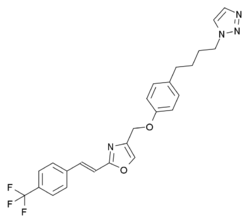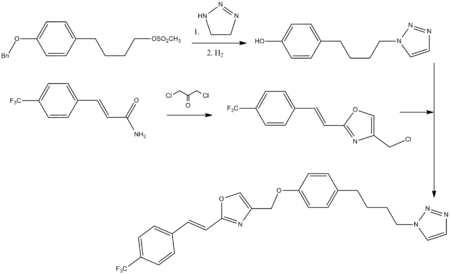Mubritinib
Mubritinib (TAK-165) is a protein kinase inhibitor which was under development by Takeda for the treatment of cancer.[1][2][3] It completed phase I clinical trials but appears to have been discontinued, as no new information on the drug has surfaced since December 2008.[4]
 | |
| Clinical data | |
|---|---|
| Routes of administration | Oral |
| ATC code |
|
| Legal status | |
| Legal status |
|
| Identifiers | |
| |
| CAS Number | |
| PubChem CID | |
| IUPHAR/BPS | |
| ChemSpider | |
| UNII | |
| ChEMBL | |
| Chemical and physical data | |
| Formula | C25H23F3N4O2 |
| Molar mass | 468.480 g·mol−1 |
| 3D model (JSmol) | |
| |
Synthesis

gollark: My secrets are stored in the secrets hashset, which is on the server with the beliefs hashset.
gollark: I guess deciseconds might make more sense.
gollark: Minutes? Doubtful.
gollark: I mean, what other time unit would it be?
gollark: Yes.
See also
References
- McCormick, Frank; Doriano Fabbro (2005). Protein Tyrosine Kinases: From Inhibitors to Useful Drugs (Cancer Drug Discovery and Development). Totowa, NJ: Humana Press. ISBN 1-58829-384-X.
- Mitscher, Lester A.; Lednicer, Daniel (1977). The organic chemistry of drug synthesis. New York: Wiley. ISBN 0-470-10750-2.
- Lednicer, Daniel (2008). Strategies for Organic Drug Synthesis and Design. New York: Wiley-Interscience. ISBN 0-470-19039-6.
- "Safety and Tolerability Study of TAK-165 in Subjects With Tumors Expressing HER2 - Full Text View - ClinicalTrials.gov".
This article is issued from Wikipedia. The text is licensed under Creative Commons - Attribution - Sharealike. Additional terms may apply for the media files.